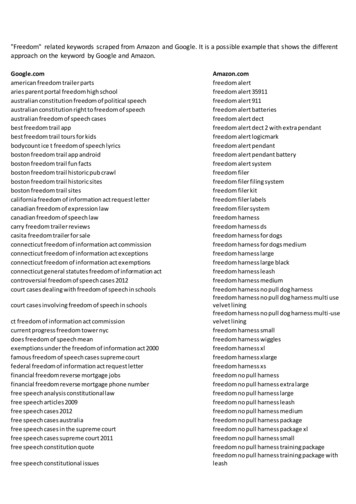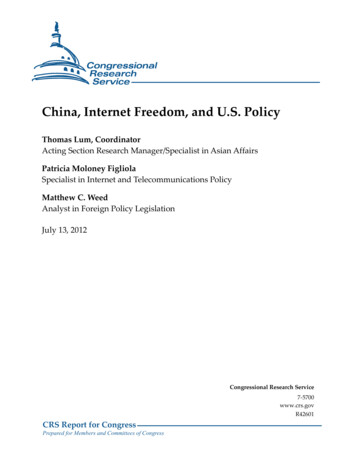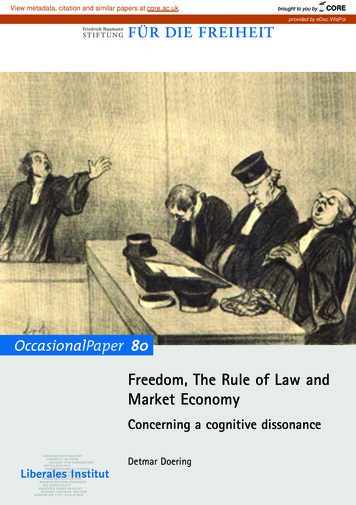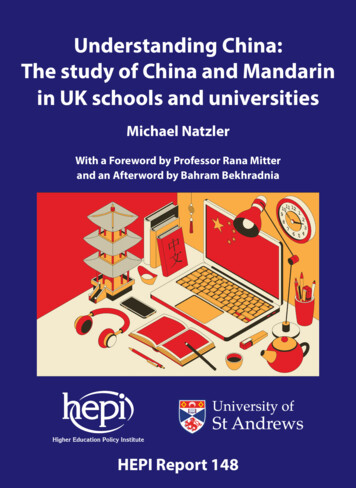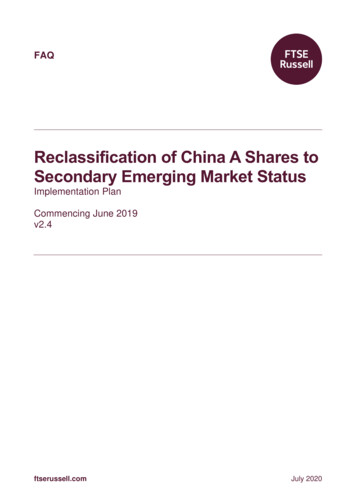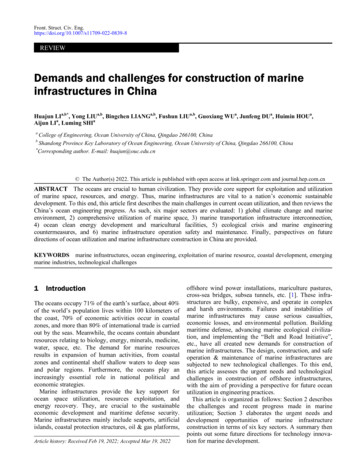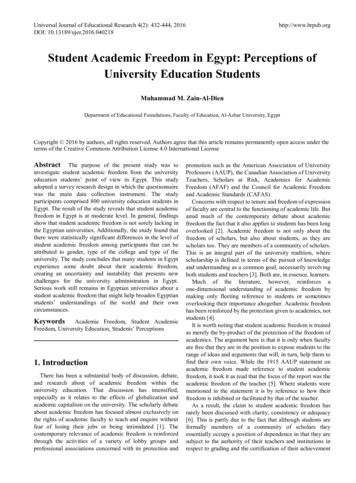
Transcription
CHINA MEDIA BULLETINA biweekly update of press freedom and censorship newsrelated to the People’s Republic of ChinaIssue 95: October 29, 2013HeadlinesPaper forced to retreat after bold defense of detained journalistPeking University fires dissident scholar Xia YeliangSocial media mum on Yuyao flooding, blogger crackdown citedOverlooking censorship, foreign media leaders flock to Chinese summitBeijing blocks criticism at UN rights reviewPHOTO OF THE WEEK:A BOLDFACE CRY FOR FREEDOMCredit: Sina Weibo
BROADCAST / PRINT MEDIA NEWSPaper forced to retreat after bold defense of detained journalistOn October 18, journalist Chen Yongzhou of New Express newspaper in Guangzhou, GuangdongProvince, was summoned by local police and then turned over to authorities from Changsha, HunanProvince. He was accused of “damaging the business reputation” of Zoomlion, one of the country’slargest construction machinery businesses, which is partly owned by the Hunan government. Afterseveral days of quiet attempts to secure Chen’s release, New Express published a full front-pageeditorial with the headline “Please Release Him.” It defended Chen’s reporting, claiming that staffhad reviewed his 15 articles about Zoomlion and discovered only one minor error. The editorial wasa rare example of Chinese media directly appealing to the public over the unfair treatment of one oftheir journalists. In an outcry reminiscent of the January protest against censorship atGuangzhou’s Southern Weekly (see CMB special), New Express garnered support from prominentbloggers and business figures. The Central Propaganda Department reportedly instructed media notto cover the incident, but several commercial papers published statements of solidarity. A stronglyworded editorial from the Southern Metropolis Daily—about how Chen’s cross-regional detention wassending a chill through the media—was allegedly removed by propaganda authorities; the paper thenpublished a different editorial on the case. On October 24, New Express repeated its call for Chen’srelease in a small front-page story. Two days later, official media began reporting that Chen hadconfessed to printing disinformation about Zoomlion in exchange for payment. He was paraded onChina Central Television (CCTV) in a prison uniform and confessed on camera, adding to a broadertrend of televised statements of guilt or contrition in recent months (see CMB Nos. 93, 94). OnOctober 27, New Express printed a small apology for its earlier statements, reportedly under pressurefrom authorities. Meanwhile, Zoomlion’s share price tracked its change in fortune, recovering afterChen’s televised confession indicated that the firm would be protected by its government patrons.This is not the only backlash New Express has faced recently for its reporting. On September 30,another detained journalist, Liu Hu, was formally charged with criminal defamation for his coverageof a scandal involving Chongqing officials (see CMB No. 92). New Express 10/23/2013: 长沙警方请放人 [Changsha police please release theperson] China Digital Times 10/22/2013: Guangdong newspaper pleads for journalist’srelease (updated)China Media Project 10/23/2013: Paper goes public over reporter’s detentionChina Media Project 10/24/2013: The New Express story in today’s papersChina Digital Times 10/24/2013: Minitrue: Do not report on Chen Yongzhou’s arrestXinhua 10/26/2013: China exclusive: Detained reporter apologizes for releasinguntrue storiesBBC 10/26/2013: China reporter Chen Yongzhou ‘confesses’ on TVSouth China Morning Post 10/28/2013: Guangzhou paper apologises for detainedreporter’s storyBloomberg 10/28/2013: Zoomlion shares rise after daily apologizes: Hong Kongmoverwww.freedomhouse.org
Reporters Without Borders 10/11/2013: Detained investigative journalist formallycharged with defamationEying foreign companies, state TV rounds on Starbucks and SamsungIn an echo of its campaign against U.S. technology giant Apple in March (see CMB No. 84), statebroadcaster China Central Television (CCTV) on October 20 took aim at another Americancompany, the global coffee retailer Starbucks. CCTV reported that based on an investigationconducted by its news correspondents in London, Chicago, and Mumbai, Starbucks charged up to50 percent more for some of its products in China than in the United Kingdom, the United States,and India. After showing footage of Chinese customers complaining about the cost of Starbucksbeverages, the 22-minute program concluded in a nationalistic tone that the company’s allegedlyexploitative pricing was found only in China. However, on the popular microblogging platform SinaWeibo, many netizens said the coverage was unnecessary, and some asked why the station did notinvestigate more important issues. Others noted that the prices were competitive and worth payingbecause “the quality makes people feel safe” in China’s scandal-ridden food industry. A Starbucksspokesman said price variations between countries depended on factors like labor costs, rent, andthe expense of raw materials. Reuters noted that imported products in China, such as coffee beans,draw importation and sales taxes of 15 and 17 percent, respectively. On October 22, CCTV aired afinancial news program that targeted another successful foreign company, Samsung Electronics ofSouth Korea. According to the program, there was a problem with the memory chips of some ofSamsung’s smartphone models, causing them to crash, and the flaw was not covered under thecompany’s warranty. In a statement issued on October 23, Samsung said it would start offering freerepairs and other services to its customers in China. State media have singled out a number offoreign firms with large market shares in China in the past year, but the Wall Street Journal notedsubtle differences between the attacks. The criticism of Apple, for example, came during CCTV’sprimetime newscast, suggesting a higher priority, while the rebuke of Samsung was aired on a lesspopular show on CCTV-2. Quartz 10/22/2013: First Starbucks, now Samsung, China’s state TV goes afterforeign firms for ‘bullying’ Chinese customersWall Street Journal 10/21/2013: Starbucks is criticized by Chinese state media forhigher pricesCCTV 10/22/2013: 高价 [Video:Investigation: Starbucks coffee costs more in Chinese market]Wall Street Journal 10/23/2013: Samsung apologizes to Chinese consumers forhandset flawsSamsung China 10/23/2013: 三星(中国)投资有限公司声明 [Samsung (China) Groupstatement]Reuters 10/21/2013: Starbucks is charging higher prices in China, Chinese mediaclaimswww.freedomhouse.org
Peking University fires dissident scholar Xia YeliangCiting “poor teaching,” China’s prestigious Peking University (PKU) on October 18 dismissedeconomics professor Xia Yeliang, an outspoken critic of the ruling Chinese Communist Party (seeCMB No. 91). The decision was made a week after the school signed a pact with a consortium ofChinese, European, Australian, and American universities in Hefei, Anhui Province, that vowed touphold academic freedom. A statement posted on PKU’s website claimed that Xia’s teachingperformance had been ranked the lowest among the university’s faculty for many years, making thecase that the firing was not based on his political views. However, the Wall Street Journal reported onOctober 25 that the professor, a signer of the prodemocracy manifesto Charter 08, was warned in2009 to “take good care” of his teaching position. For years he had been barred from appearing onstate television, followed by plainclothes police, and repeatedly detained and questioned. Xia said hemay be forced to go abroad as a visiting scholar if he could not find another job offer in China. Hisdismissal was seen as part of widening crackdown on dissent by the new party leadership underPresident Xi Jinping. Despite the growing scale of cooperation and exchanges between Chinese andforeign universities in recent years, the Chinese political authorities have yielded little control overdomestic institutions. “All universities are under the party’s leadership,” Xia lamented. “In PekingUniversity, the No. 1 leader is not the president. It’s the party secretary of Peking University.”Meanwhile, with the notable exception of Massachusetts-based Wellesley College, most of PKU’sforeign partner schools have remained silent about its apparent assault on academic freedom. Wall Street Journal 10/25/2013: Xia Yeliang: The China Americans don’t seeSouth China Morning Post 10/23/2013: Expelled scholar Xia Yeliang may have totake US visiting scholarshipPeking University 10/18/2013: 关于对夏业良终止聘用合同的说明 [Statement ontermination of contract with Xia Yeliang]South China Morning Post 10/15/2013: Nine Chinese universities sign academicfreedom pactNew York Times 10/21/2013: Beijing’s assault on academic freedomMedia coverage muted as Bo Xilai sentence upheldSince the Intermediate People’s Court in Jinan, Shandong Province, announced in late Septemberthat ousted Chongqing Communist Party chief Bo Xilai had been sentenced to life in prison forvarious counts of corruption (see CMB No. 94), domestic media coverage surrounding the case hasdwindled considerably. After the Jinan High People’s Court rejected Bo’s appeal on October 25, theofficial Xinhua news agency posted a brief announcement that the court was “reaffirming theoriginal sentence of life imprisonment.” The New York Times noted that the higher court offeredlittle information on the hearing compared with the unusually detailed disclosures about the trial inAugust. Under reported censorship orders, media outlets carried only Xinhua’s articles on theappellate ruling, and pro-Bo comments were allegedly deleted from social media, leaving mostlypositive remarks about the sentence.www.freedomhouse.org
Reuters 10/25/2013: China court upholds life sentence for Bo XilaiNew York Times 10/24/2013: Court upholds life sentence for Bo XilaiChina Digital Times 10/25/2013: Bo Xilai: Out of sight, but not out of mindNEW MEDIA / TECHNOLOGY NEWSSocial media mum on Yuyao flooding, blogger crackdown citedOn October 7, Typhoon Fitow came ashore in southeastern China, dropping the heaviest rainfall ina century on the city of Yuyao, Zhejiang Province, and causing severe flooding. The following week,residents took to the streets after state media falsely reported that all had returned to normal. Severaldays later, larger crowds decried inadequate relief efforts, demanded the local party secretary’sresignation, and vandalized police cars. On October 15, the authorities sent riot police to quell thedemonstrations. Although some news of the developments was shared via the social-media platformSina Weibo, observers noted that online discussion and the involvement of top opinion leaders waslimited compared with other natural disasters over the past year. They attributed the change to thechilling effect of a recent crackdown—including arrests of both prominent and little-knownmicrobloggers—aimed at enforcing strict September judicial guidelines on the dissemination of“online rumors” and other supposedly harmful information (see CMB No. 93). Bloomberg reportedthat 170,000 items on Yuyao were posted, far fewer than the almost five million posts on an Aprilearthquake and 610,000 regarding Beijing flooding in 2012 (see CMB Nos. 66, 86). Moreover, fewermicrobloggers with large followings reposted news, asked sharp questions, or called for governmentaccountability than in the past, while searches for Yuyao and words related to the protests wereblocked on Sina Weibo, limiting the spread of such information. However, as traditional mediasought to control coverage, they stoked the angry protests, causing Liz Carter of Tea Leaf Nation toask whether the online censorship had backfired by channeling public frustration onto the street. OnOctober 17, China Central Television (CCTV) promoted its upcoming evening news program onWeibo, promising an investigation of the cause of flooding and apparently linking it to localgovernment failures. But no such story aired, and the preview post was deleted, promptingspeculation that the show had been censored at the last minute. In a related incident, on October 15political cartoonist Wang Liming, also known as Rebel Pepper (see CMB Nos. 52, 72), was detainedafter posting information about Yuyao and a cartoon depicting a faceoff between police andprotesters. The Beijing Times reported that he had been held for spreading rumors but released whenauthorities determined that there was no “malice” behind his posts. Wang confirmed his release thefollowing day; his name was censored on Sina Weibo during his brief detention. Offbeat China 10/11/2013: Unrest in flooded Chinese city Yuyao over untruthfuldisaster reportingTea Leaf Nation 10/17/2013: Is social media censorship of a deadly flood backfiring?Fei Chang Dao 10/19/2013: Cartoonist Wang Liming detained for rumor aboutYuyao, Sina Weibo censors searches for ‘Rebel Pepper’www.freedomhouse.org
Reuters 10/16/2013: China sends riot police to block new protests by flood victimsSouth China Morning Post 10/18/2013: Who censored CCTV’s report on Yuyao’sflood chaos?China Digital Times 10/18/2013: Chill in social media apparent in flood responseChina Digital Times 10/16/2013: Riot police block new protests by flood victims inYuyaoTIBET & XINJIANGTibetan writers arrested, woman held for WeChat messagesAccording to Paris-based Reporters Without Borders, the Chinese authorities on October 11–12detained three Tibetan writers who had provided outside observers with information aboutconditions in Driru (Biru) County, Nagchu (Naqu) Prefecture, in the Tibet Autonomous Region.The government said they were detained for carrying out “political activities aimed at destroyingsocial stability and dividing the Chinese homeland.” The authorities had recently ordered Driruresidents to fly the Chinese flag from their homes, setting off protests and a deadly crackdown bysecurity forces. Tsultrim Gyaltsen, known by the pen name Shokdril and formerly the editor of aTibetan-language magazine, New Generation, was detained on October 11 in Driru. His computer,mobile telephone, and other belongings were confiscated from his home. An associate, Yulgal, wastaken the next day. Kalsang Choedhar, a monk from Palyul monastery in eastern Tibet, was alsodetained on October 12, and his whereabouts remained unknown. Separately, the overseas Tibetannews site Phayul reported that a Tibetan woman named Kalsang from Driru had been arrested onOctober 11 for expressing “anti-China” sentiments on WeChat, a popular Chinese mobile-phonemessaging platform that strictly adheres to Beijing’s censorship rules (see CMB No. 92). She alsoallegedly stored photos of Tibetan spiritual leader the Dalai Lama and banned Tibetan-languagesongs on her phone. Phayul noted that an increasing number of dissidents relied on WeChat forcommunications, raising concerns that this could facilitate Chinese government surveillance. Reporters Without Borders 10/16/2023: Wave of arrests contributes to Tibet’sgrowing isolationPhayul 10/17/2013: WeChat leads to Tibetan woman’s arrest in DriruRadio Free Asia 10/11/2013: Four Tibetans shot dead as protests spread in DrirucountyPolice arrest scores of Uighur netizens for ‘jihad’ talkXinjiang Daily, a Chinese state-run paper, reported on October 8 that from June 26 to August 31,police in Xinjiang had investigated 256 people for allegedly spreading “online rumors,” 139 of whomwere said to have disseminated information about jihad or other religious ideas. Some 110 peoplewww.freedomhouse.org
were reportedly detained. Xinjiang’s ethnic Uighurs, who speak a Turkic language and arepredominantly Muslim, have long been subjected to cultural and religious repression. Theyfrequently face arbitrary detention and arrest for activities, including peaceful religious practice, thatthe Chinese authorities view as incitement to separatism and religious militancy (see CMB No. 89).The latest crackdown was associated with a nationwide campaign to punish internet users forspreading “online rumors” (see CMB No. 93). According to Xinjiang Daily, one of those arrested wasa schoolteacher who had produced video clips promoting religious extremism that were widelyviewed and shared on the microblogging platform Sina Weibo. Another was a farmer who hadallegedly uploaded e-books containing separatist materials to a website he created, allowingthousands of others to download them. However, the paper did not describe the exact nature of theallegedly incriminating materials, and the government generally prevents foreign journalists andindependent researchers from accessing the region, making verification of such allegations difficult.Dilxat Raxit, a spokesperson for the exiled World Uyghur Congress, said the latest accusations werea “total distortion of the truth” that formed part of a larger campaign to “suppress Uighurs’ use ofthe internet to obtain information and express different points of view.” He said those detained hadmerely “expressed discontent with Chinese rule and systematic repression in the area.” BBC 10/8/2013: China arrests 110 in Xinjiang for spreading online rumoursAgence France-Presse 10/8/2013: Xinjiang police arrest 139 people for ‘spreadingreligious extremism including jihad’Reuters 10/8/2013: China police target online ‘jihad’ talk amid rumor crackdownXinhua 10/8/2013: 新疆警方查处 139 人传播"圣战"等宗教极端思想 [Xinjiangpolice detain 139 people for spreading extremism including 'jihad']HONG KONGLack of transparency on TV licensing decision prompts protestsOn October 15, the Hong Kong government granted free-to-air television licenses to twoapplicants—PCCW and I-Cable Communications—in a move that ended the nearly 40-year duopolyof Television Broadcasts (TVB) and Asia Television (ATV) in the territory (see CMB No. 87).However, officials rejected an application filed by startup operator Hong Kong Television Network(HKTV) without immediate explanation, raising concerns that the government had favored largebusinesses with vested interests in the political status quo. Both PCCW and I-Cable are controlledby billionaire tycoons with close ties to the central government in Beijing. The announcement andlack of transparency surrounding the criteria for the decision prompted a protest by at least 36,000people on October 20. Many expressed discontent with Hong Kong chief executive Leung Chunying and said the licensing decision had undermined the territory’s freedom of speech and rule oflaw. On October 25, tens of thousands of protesters rallied outside the government headquarters todemand an explanation, but Leung refused to provide any information, citing pending courtchallenges. HKTV chairman Ricky Wong Wai-kay said the decision was “unjust.” He noted that hiscompany had spent more than HK 900 million before its application was turned down, and warnedthat it would be forced to cut 320 jobs by the end of October. Press freedom advocates have longwww.freedomhouse.org
questioned the constitutionality and selective application of existing procedures for granting licensesto new media outlets, as the decisions are made by the executive branch rather than an independentregulatory body. South China Morning Post 10/25/2013: Thousands of protesters demand answers onHKTV decisionBloomberg 10/26/2013: Hong Kong protesters press Leung to issue TV licenseZDNet 10/25/2013: What TV licensing decision means for Hong Kong mediafreedomSouth China Morning Post 10/17/2013: Public outcry over rejection of Ricky Wong’sfree-to-air TV license bidStandard 10/16/2013: Jolted by ‘unfair contest,’ Ricky Wong demands answers to TVlicense denial after sinking HK 900miBEYOND CHINAAmerican historian accepts censorship to publish book in ChinaThe New York Times on October 19 reported that historian Ezra F. Vogel, a professor emeritus atHarvard University, had yielded to Chinese censorship in order to publish his work in the country.As a result, several passages were excised from the mainland Chinese translation of his book, DengXiaoping and the Transformation of China, a biography of the so-called paramount leader who hadpresided over China’s economic reforms in the 1980s as well as the brutal crackdown onprodemocracy protesters in 1989. Among the censored lines were references to Deng’spreoccupation with the 1989 student protesters while dining with Soviet leader Mikhail Gorbachev,and an official order instructing Chinese newspapers not to cover the collapse of communist rule inEastern Europe. Explaining his decision, Vogel said, “I thought it was better to have 90 percent ofthe book available here than zero.” Many foreign writers have made similar choices,the Times reported, as have Hollywood film studios and other content producers seeking access tothe huge Chinese market (see CMB No. 87). Although Vogel said he was satisfied with the outcomeof his experience with Chinese censorship, St. Louis–based novelist Qiu Xiaolong told the Times thatchanges had been made to his books without his consent, leading him to decide not to publish hislatest novel in China. New York Times 10/19/2013: Authors accept censors’ rules to sell in ChinaGuardian 10/22/2013: Author bows to Chinese censorship of his Deng Xiaopingbiography Harvard Crimson 10/8/2013: Professor discussing publishing in Chinawww.freedomhouse.org
Overlooking censorship, foreign media leaders flock to Chinese summitOn October 10, representatives of China’s state-run media and leaders from international outletssuch as the Associated Press, Reuters, the New York Times, the BBC, and Kyodo News gathered inHangzhou, Zhejiang Province, for a presidium meeting of the World Media Summit, a Chineseorganized event first held in 2009. The 2013 meeting was chaired by Li Congjun, head of the officialXinhua news agency and a member of the Chinese Communist Party’s Central Committee. Asidefrom the 2012 summit in Moscow, past gatherings have all been held in China (see CMB No. 34).While the latest meeting was widely covered in the Chinese media—garnering a special section onXinhua’s website—it received scant mention elsewhere. David Bandurski of Hong KongUniversity’s China Media Project characterized the summit as “the media event that all major globalmedia players attend but none bother to actually cover,” suggesting that this was due to the foreigndelegates’ embarrassment at associating themselves with the Chinese government’s extensivecensorship and suppression of media freedom. Indeed, a number of the participating outlets havefaced website blocking and other major reporting obstacles in China. Bandurski argues that thesummit grew out of top party leaders’ desire to influence international coverage of China rather thanto resolve challenges facing global media. This year’s meeting took place at a particularly ironicmoment as the Chinese authorities engage in a crackdown on free expression. Li Congjun himselfauthored an article in the People’s Daily last month that Bandurski calls “one of the most hardlinepieces on the CCP’s press control priorities to appear in China in recent years.” As part of itscoverage of the meeting, Xinhua made two announcements: that the group was discussing thelaunch of a new global journalism prize, and that the 2014 summit would be hosted by the New YorkTimes. The paper’s website has been blocked in China since it published a Pulitzer-winning exposéon former premier Wen Jiabao’s family assets. New York Times 10/19/2013: Authors accept censors’ rules to sell in ChinaGuardian 10/22/2013: Author bows to Chinese censorship of his Deng XiaopingbiographyHarvard Crimson 10/8/2013: Professor discussing publishing in ChinaBeijing blocks criticism at UN rights reviewOn October 22, the UN Human Rights Council examined China’s human rights performance since2009 as part of the Universal Periodic Review (UPR) process, in which each country is assessedevery four years. Civil society groups from around the world submitted their shadow reports onChina to the council for the UPR meeting. However, in the lead-up to the event, Beijing increasedinternet censorship and carried out arbitrary detentions to obstruct Chinese activists who sought toparticipate in the UPR process. Prominent rights defender Cao Shunli was detained on September14 at a Beijing airport before she could board a plane to Geneva to take part in the UN gathering.Chinese authorities confirmed on October 21 that Cao had been charged with “unlawful assembly.”Another activist, Chen Jiangfang, was also reportedly stopped from flying to Geneva. During theUPR meeting, a total of 141 states contributed their comments on China, but the vast majorityreportedly used similar rhetoric that praised the regime for its treatment of rural citizens, efforts onwww.freedomhouse.org
environmental protection, and in some cases even for its notorious internet censorship apparatus,leading to speculation that Beijing had orchestrated the laudatory remarks to bury criticism.Although some states, including the United States, Britain, and Canada, did voice grave concernsregarding the Chinese government’s severe human rights violations, each was forced to present itsextensive list of recommendations in a 50-second time slot due to the large volume of statessubmitting comments. Voice of America 10/22/2013: China to appear before UN Human Rights CouncilUniversal Periodic Review—ChinaWashington Free Beacon 10/22/2013: West criticizes, China defends human rightsrecord at U.N.Huffington Post 10/24/2013: Wide acclaim for China’s state-centered, collectivehuman rightsUN News Centre 10/16/2013: UN experts alarmed by reprisals against Chinesehuman rights activistsAmnesty International UK 10/24/2013: [CHRB] Cao Shunli’s detention confirmed,crackdown expands as China touts ‘Achievements’ at UN review (10/17-23, 2013)NOTABLE ANALYSISU.S. congressional panel holds hearing on Guo Feixiong, freedom ofexpressionOn October 29, a subcommittee of the U.S. House of Representatives Foreign Affairs Committeeheld a hearing titled “Guo Feixiong and Freedom of Expression in China.” It focused on thedetention in August of Guo (see CMB No. 92), a prominent rights advocate from Guangzhou. Hehad called for officials to declare their assets and publicly supported demands for greater pressfreedom after journalists at the Southern Weekly went on strike in January. He was previouslyimprisoned for five years, from 2006 to 2011, and was reportedly tortured in custody. Among otherwitnesses, Guo’s wife and daughter and exiled legal activist Chen Guangcheng gave testimony. Theirsubmissions and a video of the hearing are available at the link below. House Foreign Affairs Committee 10/29/2013: Subcommittee hearing: Guo Feixiongand freedom of expression in ChinaFor additional information on humanrights and free expression in China,see:Freedom in the World 2013Freedom of the Press 2013Freedom on the Net 2013To subscribe or submit items, e-mail:cmb@freedomhouse.orgFor archives, go .org
Social media mum on Yuyao flooding, blogger crackdown cited . Eying foreign companies, state TV rounds on Starbucks and Samsung In an echo of its campaign against U.S. technology giant Apple in March (see CMB No. 84), state broadcaster China Central Television (CCTV) on October 20 took aim at another American .
